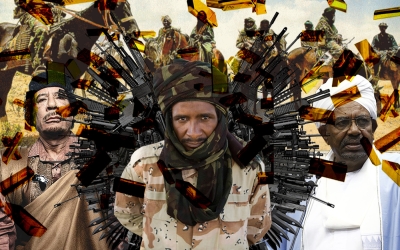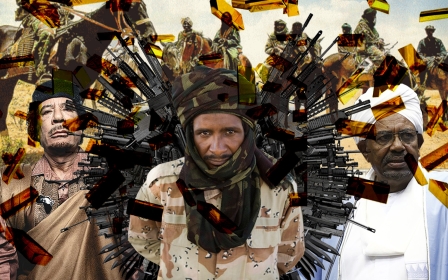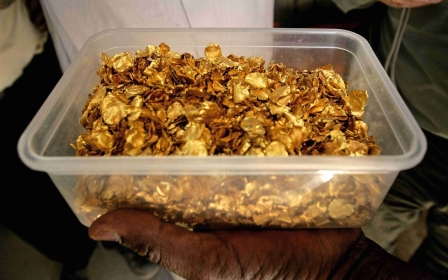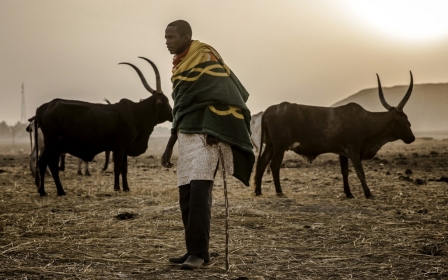Sudanese villagers battle to save environment from gold miners and militias

Militia-backed gold mining companies that have operated unregulated in Sudan's conflict zones are facing a battle with local residents angered by the environmental damage caused by chemicals used to extract the gold.
For three weeks, residents of Talodi and Kalogi in the Nuba mountains, the heart of one of Sudan's most violent conflicts, have held protests demanding gold mines in the area are closed.
Since 5 September, locals have been holding a sit-in outside a gold-mining factory they demand is closed because of its use of cyanide as a crude method of extracting gold.
The protest was backed by the Sudanese Professionals Association (SPA), which became an organising force in nationwide protests that toppled three-decade ruler Omar al-Bashir earlier this year.
"Local citizens have been struggling for three years against the use of this deadly material," the SPA said in a statement announcing the strike.
New MEE newsletter: Jerusalem Dispatch
Sign up to get the latest insights and analysis on Israel-Palestine, alongside Turkey Unpacked and other MEE newsletters
The local resistance committee, part of a nationwide network of activist groups, then announced a civil disobedience campaign on 9 September.
A call for civil disobedience in Talodi and surrounding areas posted on 9 September
Since then, similar sit-ins have been started in other areas affected by cyanide gold mining, including Sudan's northern state, Amsterdam-based Sudanese broadcaster Radio Dabanga reported.
On Thursday, a similar type of crude mine collapsed in Chad, killing around 30 workers, the AFP news agency reported.
The protesters have also called for the gold mines to be cleared of fighters from the Rapid Support Forces paramilitary headed by Mohammed Hamdan Dagolo, known as Hemeti, who became one of Sudan's most powerful figures in the aftermath of Bashir's fall.
According to Human Rights and Development Organization (HUDO), a Sudanese NGO, Hemeti took ownership of the mines in Talodi through his Al Juneidi company.
The same company has been accused of unregulated exports of gold to the United Arab Emirates from gold mines that Hemeti seized control of in 2017 in Darfur, the western Sudanese region where his forces and associated militia known as the Janjaweed have been accused of genocide.
Twelve people were killed by security forces at a gold mine near Talodi in April, according to the UN, and the heavy RSF presence has been blamed for increasing tensions with the local community.
Decaying bodies
The crude extraction of gold used in many of Sudan's mining operations involves excavating land and separating gold from the soil using mercury and cyanide.
Sudanese activists Sudan Democracy First have claimed that this process results in serious environmental damage because companies then dump the waste chemicals.
Local communities say the mining operations have caused an increase in health problems as well as damage to the environment.
A 2018 aid agency assessment of conditions for the tens of thousands of displaced people near Talodi warned that boreholes and human waste, including decaying bodies left behind at the mining sites, cause pollution of water sources during the rainy season.
Lucrative exports to the Gulf
Sudanese civil society group Gidaam announced a protest in three Nuba towns on Thursday calling for the removal of the South Kordofan governor.
"A march of millions will be launched in three towns to overthrow the governor who collaborates with the owners of the factories and gold-mining companies, who belong to the old regime," Gidaam said in a statement.
According to HUDO, the governor issued an order, which has not been heeded by the RSF, for gold mining operations to be halted.
HUDO also claimed that mining permits were previously issued in Talodi by a former governor who is now an RSF commander.
Control of gold, which is often sold to the government and then exported to the Gulf, has been seen as increasingly desirable for businesses and militias in Sudan since the secession of South Sudan in 2011 slashed the majority of Sudan's oil output.
The UN estimates that from 2010 to 2014, $4.6bn worth of gold was illegally exported to the UAE from Sudan.
Middle East Eye delivers independent and unrivalled coverage and analysis of the Middle East, North Africa and beyond. To learn more about republishing this content and the associated fees, please fill out this form. More about MEE can be found here.





